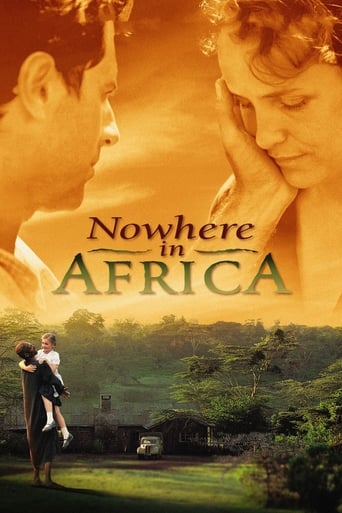One family's tale of a homeland lost... and a homeland found.
"Nirgendwo in Afrika" (2001), a poignant German film produced by Media Cooperation One and MTM Cineteve, transports viewers to the heart of Kenya during World War II. Directed by Caroline Link, the movie delves into the life of a Jewish family fleeing Nazi persecution in Germany, seeking refuge in the vast African landscape. The narrative centers on the Redlich family, particularly the young daughter Regina, as they navigate the challenges of adapting to a new culture and environment. The film's rich tapestry of human emotions and cultural clashes is masterfully woven, offering a compelling exploration of identity, resilience, and the search for belonging. The film's strength lies in its nuanced portrayal of the characters' internal and external struggles. Walter Redlich, played by Merab Ninidze, grapples with the loss of his social status and the harsh realities of farming life, while his wife Jettel, portrayed by Juliane Köhler, clings to her European sensibilities, struggling to connect with the local community. Their daughter Regina, brilliantly brought to life by Lea Kurka, serves as a bridge between the two worlds, embracing the Kenyan culture with an open heart and learning the local language from her friend Owuor, played by Sidede Onyulo. The dynamic interplay between these characters highlights the film's central theme of adaptation and the transformative power of human connections. Visually, "Nirgendwo in Afrika" is a feast for the eyes, with breathtaking cinematography that captures the sweeping beauty of the Kenyan savannah. The film's attention to detail in depicting the daily life and customs of the local people adds a layer of authenticity that enriches the storytelling. The lush landscapes serve as a stark contrast to the family's internal turmoil, symbolizing both the promise of a new beginning and the overwhelming challenges they face. The evocative score by Niki Reiser further enhances the emotional depth of the narrative, creating a harmonious blend of sight and sound that immerses the audience in the Redlich family's journey. "Nirgendwo in Afrika" received widespread acclaim, culminating in an Academy Award for Best Foreign Language Film in 2003. Its universal themes of displacement and the quest for identity resonate with audiences worldwide, making it a timeless piece of cinema. The film's success lies not only in its compelling storytelling and stunning visuals but also in its ability to evoke empathy and understanding for the human condition. Through the lens of a family's struggle to find a new home, "Nirgendwo in Afrika" offers a poignant reminder of the resilience of the human spirit and the enduring power of hope.
年2001
上映時間140 分
ジャンルドラマ
製作国Germany


